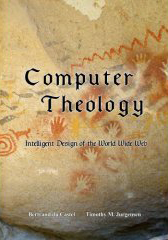PRESS
COMPUTER THEOLOGY |
||||
|
11 Revelation
William Shakespeare Sigh of the Oppressed
Karl Marx
remarked in a manner seemingly pejorative that “Religion … is the opium of the
people.” In the fullness of his complete observation, extracted from his Critique of Hegel’s Philosophy of Right,
the comment is perhaps less than pejorative and, in fact, offers a prescient
interpretation on many levels. At a basic physiological level, the state of
ecstasy that is foundational to the formation and continuance of religious
social structures is comparable to the state induced by a variety of opiates,
including those used for medical treatment, specifically the treatment of
severe pain. Conversely, religion itself is often viewed as a treatment for
both psychological as well as physical pain; a point that would seem to be more
in line with Marx’ full meaning. Consider some of the additional context
regarding his oft repeated quote noted above: “Religion is the sigh of the
oppressed creature, the heart of a heartless world, and the soul of soulless
conditions. It is the opium of the people.” Clearly, he recognized that religion
is a force to be reckoned with. However, from his perspective the benefits of
religion were illusory and hence detracted from the “real” solution to the
problems faced by “the workers” in existent social settings. To Marx, religion
was the drug that soothes the symptomatic pain, but it did not address the
underlying disease. This perception of the illusory nature of religious
manifestations is rather typical of scientific discourse. It is perhaps also
illuminating that with this seeming denigration of the effectiveness of
religion, Marx, and his associate Friedrich Engels, laid the groundwork for a
social framework to be pursued through essentially religious means. Perhaps
therein lay the greater truth in Marx’ observations on religion. Religion
presented a powerful competitive social ecosystem to communism; and vice-versa. We observe that
the mechanisms inherent in religions’ apparent effectiveness, witnessing its
ubiquity, seem to be consistently ignored within the scientific community.
Certainly, there is a perception that one’s personal religious preferences are
not a subject of polite, scientific conversation; rather like having a
painfully obvious deformity of one’s person. This detachment is understandable
when the intent is to distance the seemingly subjective aspects of religious
endeavors from the equally seemingly objective consideration of natural
effects. However, one can entertain the possibility that in the |
||||
|
||||
© Midori Press, LLC, 2008. All rights reserved for all countries. (Inquiries) The contents of ComputerTheology: Intelligent Design of the World Wide Web are presented for the sole purpose of on-line reading to allow the reader to determine whether to purchase the book. Reproduction and other derivative works are expressly forbidden without the written consent of Midori Press. Legal deposit with the US Library of Congress 1-33735636, 2007.
|
ComputerTheology Intelligent Design of the World Wide Web Bertrand du Castel and Timothy M. Jurgensen Midori Press, Austin Texas 1st Edition 2008 (468 pp) ISBN 0-9801821-1-5 |
Book available at Midori Press (regular) |
